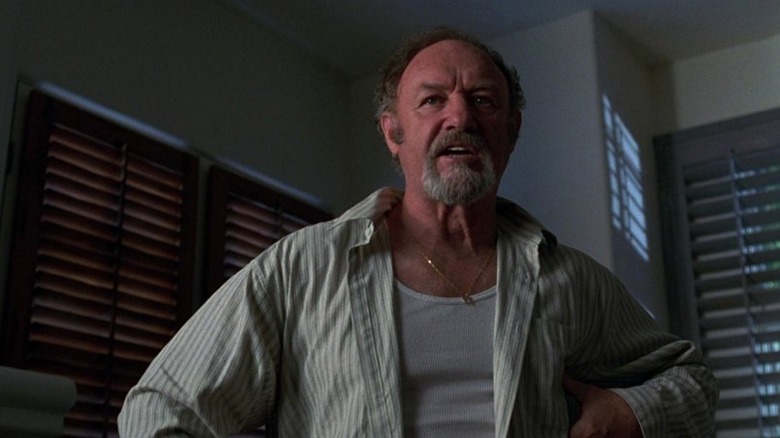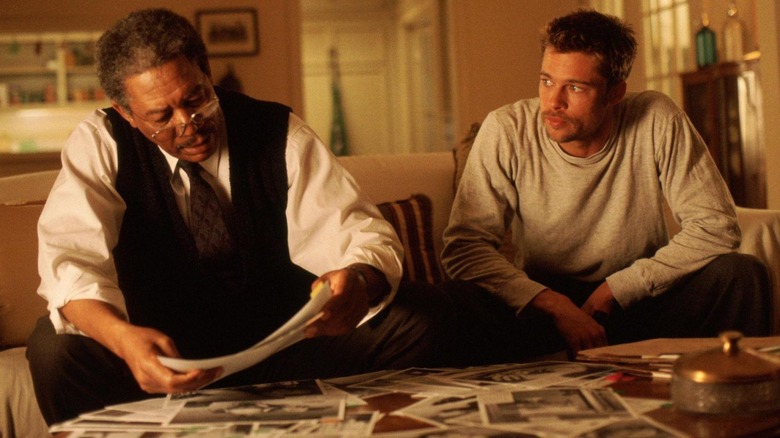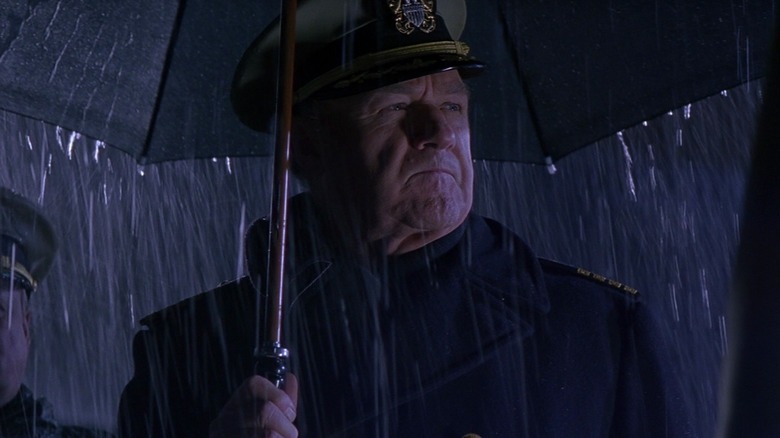Gene Hackman's Reason For Turning Down Se7en Makes No Sense
The late, great Gene Hackman likely turned down 10 times as many jobs as he took. He was such an acclaimed actor, and so pliable when it came to tone and genre, he must have been highly in demand for several decades in a row. He was one of those performers who was both excellent at his craft and a massive box office draw, so naturally, everyone wanted to collaborate with him. Hackman was also notorious cantankerous on sets, however, often becoming enraged when working with actors he felt to be less-than-professional. The stories that director Barry Sonnenfeld has told about Hackman on the set of "Get Shorty" alone are quite colorful.
It seems that one of the many high-profile roles that Hackman rejected was William Somerset, the hope-drained homicide detective at the center of David Fincher's 1995 serial killer thriller "Seven." The role ultimately went to Morgan Freeman, but it took the production a while to settle on him. Those who have seen "Seven" will recall that the film is so relentlessly bleak and hopeless that it almost emerges as parody. Its story follows Somerset and his partner, Mills (Brad Pitt), as they investigate a serial killer who is murdering victims to match the Seven Deadly Sins. By the time we reach the movie's ending, the killer (Kevin Spacey) has even managed to complete his twisted project in an unexpected way. Lots of people are dead and no one is happy.
But despite what you might think, it wasn't the despair that kept Hackman away. In fact, his lack of interest had nothing to do with his perception of the project's quality at all.
Hackman turned down Seven because he didn't want to shoot at night
By the time Fincher had signed on to direct "Seven," the role of Somerset had already been turned down by another acting legend in the form of Al Pacino. Hence, Fincher was tasked with asking Hackman to come aboard and replace him. The filmmaker was fine with that idea (seeing as Hackman was, well, one of the greatest to ever do it), but their meeting didn't go well. As Fincher recalled in a 2024 interview with the Los Angeles Times:
"They really wanted Al Pacino, and Al Pacino said no. I got involved after that. And I think the first person I spoke with was Gene Hackman. I went to meet Gene Hackman, who I was entirely intimidated by because, for my money, he might be the greatest motion picture actor of all time — just the kind of effortlessness, well-traveled humanness was something I really wanted. And I met with Gene and he said, 'It sounds like there's a lot of night shoots.' I think we had a 40-minute conversation. And I said, 'Yeah, there is.' He said, 'Count me out.' So, that was that."
Mind you, night shoots are far from unusual when it comes to film and TV productions, so it would be perfectly understandable if an industry outsider read that quote from Fincher and felt that Hackman was merely being over-demanding or uncooperative. If you will allow me, though, I would like to offer a defense in the man's honor.
In defense of Hackman's decision
It's worth noting that while night shoots are actually quite common in the industry, Hackman wasn't merely being capricious or unreasonable. Night shoots are grueling and completely throw off people's sleep schedules. They also require, at least for exterior shots, a lot of complex lighting setups, which present a whole host of interesting problems. Hackman had made enough movies by 1995 to know that he hated night shoots. He was also famous enough by then to be choosy with his roles. If he didn't want to shoot at night, then, darn it, he wasn't gonna. Hackman wasn't being spoiled. He was simply being appropriately selective.
Plus, he wasn't hurting for work. In 1995, he made "Get Shorty," Sam Raimi's "The Quick and the Dead" (a Western with some spectacular action), and Tony Scott's submarine thriller "Crimson Tide," so "Seven" wasn't a rare opportunity. It was just one potential gig of many, but one that would have required Hackman to stay up until the crack of dawn. I would have turned it down, too.


